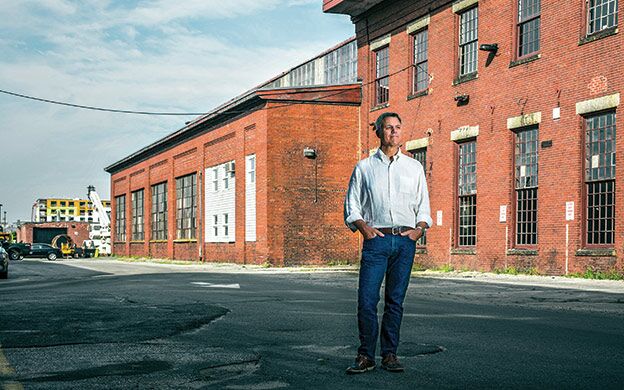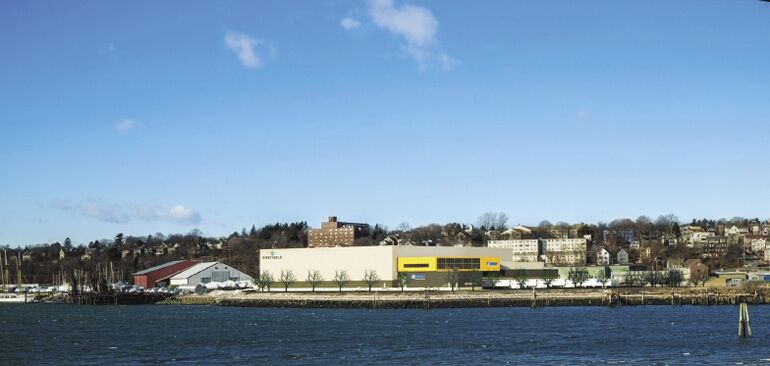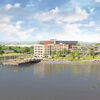NIMBY: Arrested development, as neighborhoods test veto power on zoning decisions
Mary Davis is leading a drive to give Portland neighborhoods a greater voice in rezoning proposals, including a controversial one near where she lives.
A longtime resident of the city's Stroudwater neighborhood, she opposes a planned 100-home development on the old 45-acre Camelot Farm and 10 adjacent acres. Davis and other homeowners are fighting to hold onto what they see as Portland's last remaining open space. It still retains much of its village feel, a real-life Camelot in a city with frequent flare-ups between developers and citizens often referred to as NIMBYists (for Not in My Backyard), though not everyone likes the term.
“It's a meaningless label,” says Davis, an attorney who has set out to change how all Portland zoning decisions are made.
Davis has drafted a measure that would essentially give neighborhoods veto rights over proposed zoning changes. It says that if 25% of registered voters who live or own property within 500 feet of a proposed change object to it, they can stop it from happening. A developer could override the objection with 51% of registered voters within 1,000 feet. Davis has until Aug. 7 to collect 1,500 signatures for a city-wide June 2018 referendum on the measure, which if passed would apply retroactively from May 2017.
“The referendum is not an anti-development referendum,” Davis says, but rather a way to ensure that citizens' concerns are not ignored in the planning process, currently in the hands of the Portland Planning Board, which gives a recommendation, and the City Council. Eva Polin, who has been helping Davis gather signatures, says she would rather see the farmland used as a community resource, like for skiing or Portland Trails. “I think it's a real jewel in Portland,” she says.
Clashes and battle scars
Clashes between homeowners and developers especially over bigger residential and commercial projects flare up regularly in Portland, especially on the Peninsula. From Camelot Farms to cold storage, the plot lines are similar, residents seeking to preserve their quality of life, property values and views as battle-scarred developers and municipal planners and policymakers defend cities' need to build and evolve. And while most of the high-profile disputes take place in Portland, they also occur in places such as Bar Harbor, where residents sought in vain to limit cruise-ship traffic to Maine's busiest port.
The disputes have all the elements of a big-screen drama, and indeed will be the subject of an independent film documentary, to be called “Portland, City at a Crossroads,” produced by local company Groff Film Inc. They're currently in pre-production and seeking financial backers.
“There's some angst out there about what's happening, and some enthusiasm,” says writer and director Robert Giuliana. A Bostonian in Portland since 1980, he says the film was motivated “by real interest in this lovely city that we have.”
Epic planning board battles
In real life, the public battles between neighbors and developers are played out on the streets, at the ballot box, and at Portland Planning Board meetings and workshops that can last for hours, and in the courts.
Just ask Jim Brady, whose plan to repurpose the historic Portland Co. complex at 58 Fore Street “ran into more NIMBYism than we anticipated.” That's putting it mildly about a $250 million-plus project that has yet to get off the ground, four years after he and CPB2 LLC partners Casey Prentice and Kevin Costello bought the property from Phineas Sprague in 2013.
The plan hit turbulence when a citizens' group known as Save the Soul of Portland was concerned about water views being blocked by tall buildings. Unable to stop the city from granting a zoning application, the group gathered enough signatures for a November 2015 referendum to catalog the city's scenic viewpoints and put them under stricter zoning requirements. While Question 2 was ultimately defeated — Brady recalls with every district in the city, including the local district — it came at a price, casting a shadow over the whole project. “Usually time kills deals so it was not favorable,” he says.
There was also a separate, grueling battle that dragged on for more than two years with historic preservationists, initiated by neighbors later joined by others. The main controversy was over the Portland Co.'s building No. 1, which covers a 1847 façade. To win over the City Council, the developers agreed to grant the city a 50-foot public access easement across the site in return for being able to remove the building, and agreeing to keep seven other historic buildings intact. The Planning Board gave the unanimous thumbs-up to the plan in October 2015.
In hindsight, Brady says the developer could have engaged with residents before buying the site, “and maybe we would have learned that there would have been opposition.” During his time in Italy he also ran into resistance on a project to restore two historic buildings in Venice, though found more financial obstacles there than political. In the United States, he says that NIMBYism is more common in cities like Seattle, San Francisco — and, to a lesser extent, Portland — facing a housing shortage. For that reason, he says the fact that the Fore Street project has a significant residential component helped sway voters in 2015. “The more supply we can add, the better it's going to be for housing here,” he says.
That's not an argument that will necessarily win over residents on more affordable housing, as Dana Totman has found. Totman, CEO and president of Portland's nonprofit Avesta Housing and former Brunswick Planning Board member, recalls a Munjoy Hill condominium project that sparked a public debate on parking. He was stunned when asked by one resident for advice on how to kill the project, “while we're out trying to help poor people get housing.”
And then there's the planned cold-storage facility on Portland's western waterfront that's still on ice, more than two and a half years after Americold LLC won the bid to design and build it. “The only surprise from our perspective is that it wasn't embraced immediately,” says John Henshaw, executive director of the Maine Port Authority. As for Mary Davis' zoning referendum, Henshsaw says it would be “pretty outrageous” for it to apply retroactively.
Developers strongly oppose the referendum. “If people really gave it some thought — not just the development community but the overall citizens of the city of Portland — they would think it is a bad idea to have a small cohort determine what is really a public process,” says Vincent P. Veroneau, president and CEO of commercial property company J.B. Brown & Sons. “It's neither an efficient nor an equitable way to manage the growth of the city.”
Chip Newell, principal at NewHeight Group, agrees, warning that it would be dangerous to “put power over a whole region or city in the hands of a few local people … If you let people who are able to impact events of broader interest based upon their local interest, it could mess things up on a grand scale.”
These days, most developers go into projects anticipating public opposition from the get-go and aim to start a dialog earlier. Longer term, the Maine Real State and Development Association, MEREDA, is seeking to shift the discussion away from No and towards Yes in My Backyard (YIMBY), which it highlighted in its spring conference. (See Laurie Schreiber story, Page 23)
“There are really good reasons why development is good, and they're not really heard well,” says MEREDA President Paul E. Peck, an attorney with Portland law firm Drummond & Drummond and real estate developer with LWS Development LLC. “We're trying to change the narrative a bit and talk about why development is good.”
That may take a while.
Read more
Portland's rezoning of Camelot Farm allows more homes to be built ... unless it's overturned












Comments